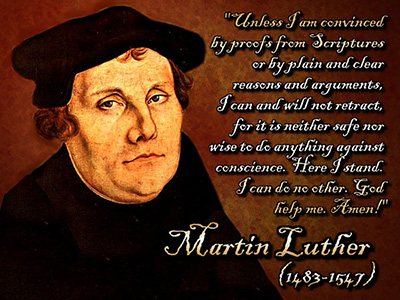|
Here I Stand

Permission is granted to reprint the following article as long as no changes are made and
the byline, copyright information,and the resource box is included. Please let me know if you use this article by sending an email to dje@newedisongazette.com.
Here I Stand
Copyright © April 18, 2015 Douglas W Jerving.
All Rights Reserved.
"Here I stand." declared Martin Luther.
He already had publicly denounced many of the most lucrative but un-biblical teachings
of the ecclesiastical system of which he was still a priestly representative. It would
not be more than a few years, and a few more trials before the leaders of the Catholic
Church, all designed to destroy him, before he would publicly denounce Rome as Babylon
and the pope as the Antichrist.
It is not hard to imagine a modern day Martin Luther nailing his thesis to a church
door (or to an equivalent church blog somewhere in the Interzone) and challenging, like
his predecessor, the doctrines of men designed around the cash value of books, dvd’s and
online courses prepared by the greatest and most erudite ear-ticklers of our times.
It is also not hard to imagine such a man or woman denouncing his/her former allegiance
to the denomination of her former choice (or his), and declaring it Babylon and its
leader the Antichrist. Criticism of that sort goes well with the territory of
fundamentalism. You have to call out somebody or some thing as your personal and universal
nemesis. It justifies personal or corporate angst; that inexplicable emotional
water-treading associated with a fear of drowning before you realize you are in water
three feet deep and the shore is just behind your back.
We Christians are living in such a time as this. We face a vast ocean as far as our eyes
can see, and we tread the water lightly, so as to preserve our energy. We hope to maintain
a few more strokes and breaths before we sink inevitably into the waves of a godless
society hollering from the shore behind us, gleefully awaiting our inundation. We have no
idea that if we would only put our feet down we would find bottom; that if we would turn
around, we would find the jeers of our opponents fail one by one by one.
The whole Reformation was based on this one simple concept.
Luther turned around and faced his accusers in the Roman Catholic church and said “Here I
stand.” Others before him and whole nations after him declared the same. “Here we stand on
solid ground. No wave shall move us, and no fear of man shall upset us.”
On Christ the solid Rock I stand;
All other ground is sinking sand.
The weight of the Reformation consisted in its stand upon Sola Scriptura: The Word of God
Alone. And that sole Word was only what was the clear message set forth in the Bible. If
justification for an idea could not be found in the Bible, it was rejected as false, or at
best it was a matter of speculation which further study of the Bible would amplify in time.
Catholicism and Protestant Lutheranism still maintained the validity of many ancient pagan
philosophies as far as they were applicable to science and politics. Modernist humanism was
born of this conflation of Reformation Christianity and neo-platonic revivalism. Calvinism
was an opponent to that syncretism, arising as a direct result. Calvin’s thrust was against
the humanistic threat to society proposed by the neo-platonic reformed Catholicism that was
infiltrating the church of his day. Calvin sought a return to a purely Biblical approach to
law, both civil and ecclesiastical.
The Reformed churches of our day for the most part, base their theology on the Calvinist ideas
that the civil law must be structured upon the case laws of Moses.
This is the basic theology of governance for all post-millennialism. The law set forth in the
Old Testament, (minus its ceremony related to prophetic events fulfilled in Christ) is still,
and always will be, applicable. In other words, the moral law has never been abrogated, and
is still applicable for all civil government. “Thou shalt not murder” is still beyond doubt a
universal law that the nations must uphold. It is a civil law. Magistrates of any nation who
violate it are subject to judgment. That is common law, common sense, and Biblically true. It
is the law.
“Thou shalt not kill” is the law. “Thou shalt not steal” is the law. The law applies to all
generations and to all people, before and after Christ, or it is no law, and God cannot judge
if it is no law. The civil law has never been rescinded. Jesus always upheld it.
We are not saved by keeping the law. We are saved by God’s grace: We are saved only by God’s
sovereign decision to pay the price for our salvation by the death of His Son on our behalf.
Amen.
------------------------
Doug Jerving is the publisher of the NewEdisonGazette.com. You may contact him at
dje@newedisongazette.com.
=================================

Return to The New Edison Gazette main site.
|
|